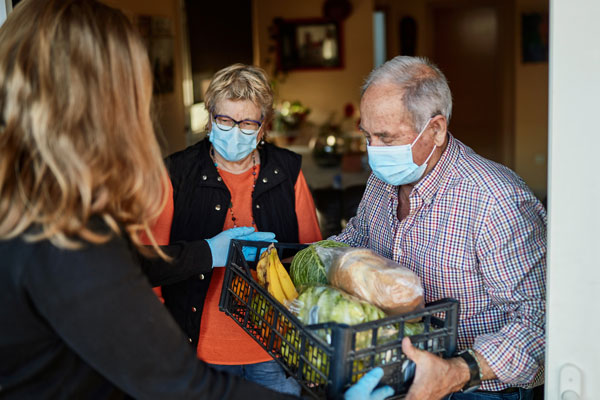It’s officially been one year since COVID-19 was declared a pandemic. As lockdowns were put into place and physical distancing has been enforced, Canadians across the country have had to adjust to a new way of life. Since the onset, there have been over 117 million cases worldwide, and over 22,000 of those have resulted in Canadian deaths. As the pandemic has developed, so have new rules surrounding travel, mask wearing, working from home, and social distancing. COVID-19 restrictions have had a serious impact on many aspects of day to day life especially for vulnerable community members including people who are facing domestic abuse, isolated seniors, and those experiencing homelessness.
While the past year has been full of challenges, Canadian charities continue to step up to support communities across the country. As these charities have also had to adapt to COVID-19, they have had to address rising demand for vital services to serve those in need. In a time when Canadians needed them most, charities like women’s shelters, food banks, crisis helplines, and organizations supporting vulnerable seniors, have gone above and beyond to provide support.

Helping Children Access Lifesaving Humanitarian Aid
Globally, the pandemic has triggered an unprecedented health, humanitarian, socio-economic, and human rights crises. UNICEF Canada, an organization that provides children with healthcare, clean water, food security, education, emergency relief and more, is helping children of all ages who have been experiencing increased hardship as a result.
Schools for more than 168 million children globally have been closed for almost a full year. Access to treatment for malnutrition and life-saving vaccines has been greatly reduced as clinics are closed due to a lack of supplies, and in the cases where they are open, parents fear visiting over concerns of contracting COVID-19.
In the midst of these challenges, UNICEF Canada developed creative solutions to ensure life saving humanitarian aid reached the children and families who need it most.
“While some changes meant assessing how we carried out campaigns – such as shifting our vaccination campaigns from mass community events to door-to-door campaigns – UNICEF scaled up others, such as providing Water, Sanitation and Health (WASH) support to communities, to provide safer water and cleaning supplies to help mitigate the spread of COVID-19.” says UNICEF Canada.
Supporting Youth Experiencing a Decrease in Mental Health
Covenant House Vancouver, an organization that offers youth who are at risk or experiencing homelessness a safe exit from life on the street, was another charity that had to adapt its operations in order to effectively serve its community members.
Kristy Hayter, Senior Manager, Communications at Covenant House Vancouver explains “We have seen an increase in young people struggling with their mental health and that has been a big area of focus this year.”
Isolation from friends and family for young people and adults alike, has taken a toll on mental health. Hayter discusses how frontline staff have found innovative ways to support youth experiencing a decrease in mental health. These include offering virtual counselling, creating opportunities for virtual and physically distanced art therapy, and creating an online mental health group in their Rights of Passage program.
Answering the Call for Canadians in Crisis
The Crisis Centre of BC, a charity providing 24/7 crisis support and suicide prevention to youth, adults, and seniors, also saw a rise in the need for mental health support over the last year. Requests for their services increased significantly since February 2020 and have remained 20-30 per cent higher since.
According to Stacy Ashton, executive director at Crisis Centre of BC, in order to keep up with demand, “we brought more crisis responders on our lines, moved our training and education online, and braced ourselves for an increase in calls.” She explains, “Our work didn’t change – it shifted. We continued to answer incoming calls and chat requests – just more of them. We continued to provide training and programming – just online. We continued to be there for individuals and communities when they needed us the most – we were simply needed more.”

Helping Vulnerable Seniors Stay Connected
Charities like HelpAge Canada, a charity that supports seniors in Canada and around the world, aside from pan-Canadian humanitarian emergency relief, focused their efforts on helping their community stay connected during uncertain times.
“COVID-19 has revealed the chronic isolation and loneliness many seniors face every day.” Says Gregor Sneddon, Executive Director at HelpAge Canada, “It further isolated seniors due to the lockdown, not just preventing their access to food and medicine, but bringing to a halt the means to participate in community, to connect with family, to participate in a society where they can belong.”
The effects of long term isolation and loneliness can lead to critical health effects and even fatality for seniors. Over the last year, HelpAge Canada has expanded their services three fold and will continue to expand their work providing seniors with access to technology and the knowledge to navigate the digital world.
Bringing Awareness to Violence Against Women
Another group that has had a spike in need for support services is women suffering from domestic violence. There has been an increase of 20-30% more violence across Canada over the past year. Women’s Shelter Canada, an organization that advocates on behalf of women’s shelters and transition houses in Canada and helps raise awareness around the issue of violence against women, has documented the sobering reality of domestic abuse during the pandemic.
“In March 2020, many shelters and transition houses saw their admittance requests dry up, their phones stop ringing,” says Kaitlin Geiger-Bardswich, Communications and Development Manager at Women’s Shelter Canada. “This eerie quiet was worse than higher rates of calls would have been, as it meant that women could no longer reach out for help as they were trapped at home with their abusers.” This is illustrated by the dramatic increase in calls and requests for admittance after the easing of lockdown measures last summer.
With police reporting not only an increase in domestic violence calls over the past year, but an increase in the severity of abuse, it is clear that charities like Women’s Shelters Canada are crucial now more than ever.

The effects of domestic violence on victims and survivors over the last year has been vast. Manitoba Association of Women’s Shelters Inc., a charity that facilitates fundraising and awareness building for domestic and family violence shelters, also found that the restrictions of the pandemic have worsened conditions for people experiencing domestic violence.
“Pre-COVID-19 we knew that victims and survivors would at some point get away from their abuser, even if it was temporary such as grocery shopping” says Deena Brock, Provincial Coordinator, “Now we fear that victims are virtual prisoners in their own homes.”
Over the last year, one of the organization’s biggest challenges has been ensuring that the message of where to find help is being spread to those in need. “They aren’t meeting up with neighbours and friends or visiting doctors and dentist offices etc., that often exposed the abuse or provided the information on where the silent victims could seek help.” says Brock.
A year into the pandemic, millions have turned to charities for support. In addition to supporting vulnerable communities, charities have improved our everyday lives in many different ways. From libraries offering curbside pick-up and bookmobiles, to theatres and arts charities moving their programming online, to children’s charities providing learning tools and assistance to children doing remote learning.. You can make a difference and help charities and communities that continue to be affected by COVID-19. Browse charities leading frontline recovery efforts and please give today.